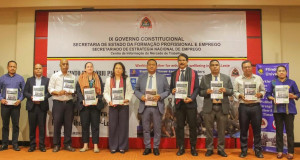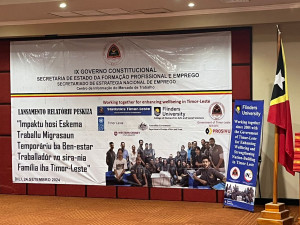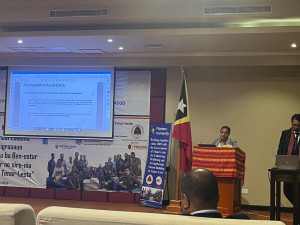Launch of the Report on the Impact of Temporary Labour Migration Schemes on the Well-being of Timorese Workers and Their Families

The Government, through the Secretariat of State for Vocational Training and Employment, in partnership with Flinders University and with the support of the Government of Australia, launched the report entitled “Impacts of Temporary Labour Migration Schemes on the Well-being of Workers and their Families in Timor-Leste”. The study provides an in-depth analysis of the effects of labour migration programmes in Australia and South Korea and makes important recommendations for the sustainable reintegration of migrant workers. 
The Secretary of State for Vocational Training and Employment, Rogério Mendonça, and Timor-Leste's Ambassador to Australia, Inês Almeida, participated in the event. Representatives from the Australian and South Korean embassies, academics, UN agency representatives, and seasonal workers also attended.
During her speech, Ambassador Inês Almeida emphasised the importance of the report, saying, “This report is a fundamental tool to help us maximise the value of our workers' experiences abroad and ensure that these experiences contribute to Timor-Leste's economic and social development”. The Ambassador also stressed the urgent need for formal recognition of the skills acquired by workers abroad and the implementation of appropriate reintegration programmes to facilitate their return to the national labour market. 
The report identifies various barriers migrant workers face when they return home, including the lack of recognition of their skills and the limitations of the domestic labour market. To reverse this situation, the report proposes the establishment of comprehensive reintegration programmes, including support for entrepreneurship and financial and business literacy workshops, to be given before, during, and after the workers' return.
Flinders University, represented at the event by Professor Udoy Saikia and Iriana Ximenes, reiterated its commitment to developing Timor-Leste through research and teaching.
Professor Saikia emphasised that the university's research not only assesses the well-being of migrant workers but also provides clear guidelines for formulating policies that ensure successful reintegration and the contribution of these workers to the country's sustainable economic growth.










































